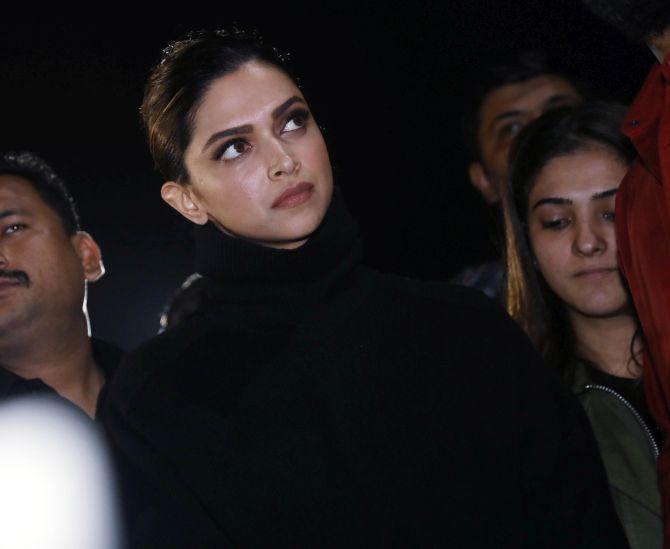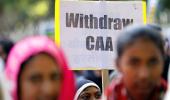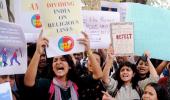'Does Deepika not have the right to raise her voice in a democratic and peaceful manner on an issue she considers important?'
'Why should one view her only as an actor and not appreciate her role as a concerned citizen of the country?' ask Aftab Alam and Mohammad Asim Siddiqui.

The silent but meaningful short presence of Bollywood star Deepika Padukone on the night of January 7 alongside JNU Students Union President Aishe Ghosh and other students to express her solidarity with students and teachers, who were brutally assaulted by masked goons armed with sticks and rods has sparked an unnecessary controversy.
Dressed gracefully in black, which is both a colour of mourning and protest, Deepika's silent presence with JNU students obviated the need to utter any words.
The reign of violence unleashed by these goons for hours who entered the campus unhindered despite the presence of the university's security guards and while the police remained deployed on the campus raises many questions as JNU has witnessed such kind of violence on the campus for the first time in its illustrious history.
Unlike Hollywood, where celebrities like George Clooney and Susan Sarandon are often lauded for their activism, the Indian film industry has an uneasy relationship with politics where a Bollywood celebrity has to often face highly polarised and angry responses, even to the level of hysteria, when they dare to take any stand on politically contentious issues.
Fear of a backlash has often forced our stars to be silent or remain extremely cautious and diplomatic.
This is also reflected in their choice of films which are usually populist in nature and rarely try to challenge the dominant discourse.
Our stars have, with a few exceptions, generally stayed away from politics.
This is what exactly happened when Deepika chose not to follow the beaten track and joined a demonstration at JNU.
Expectedly, Deepika has been trolled for standing with left-wing students who raised their voice not only against the fee hike in the university, but also against the CAA and the police brutality at Jamia Millia Islamia and Aligarh Muslim University.
Her sharing the stage with Kanhaiya Kumar particularly riled many people.
The knives are out to pronounce as publicity-hungry as her film Chhapaak was due to release three days after her appearance.
That Chhapaak is being talked about and has motivated many people to throng to cinema halls would convince the trolls that Deepika was interested in publicity.
Film stars are known not to miss any opportunity to promote their films.
They often appear on different television programmes, even in stadiums to watch cricket matches and sometimes try their bit in the commentary box.
Deepika is also being questioned on her choice of films which promoted patriarchal, regressive, right-wing propaganda.
Bajirao Mastani was a paean to Maratha valour and depicted Muslim rulers in poor light.
Padmavaat not only vilified Muslims, but also promoted narrow, regressive patriarchal practices so much so that after watching Padmavaat, film actor Swara Bhaskar felt 'reduced to a vagina'.
However, there is some pleasant irony in the fact that Chhapaak is a film about a woman's fight back and her refusal to bow down to forces inimical to women's empowerment, something Deepika must now be experiencing through the vicious trolls.
Was her presence a mere publicity stunt as claimed by many or she was genuinely moved by the violence unleashed on students and teachers at one of India's top universities?
Does she not have the right to raise her voice in a democratic and peaceful manner on an issue she considers important?
Why should one view her only as an actor and not appreciate her role as a concerned citizen of the country?
There is no conflict in her role as an actor and a concerned citizen.
It is true that some of her fans may hold a different view on the incident that occurred at JNU on January 5, but that does not take away her right to stand in solidarity with victims of violence unleashed allegedly by masked men belonging to a particular ideology?
It is unfair to troll her or to give a call to boycott her film.
Instead, she should be lauded for her courage to raise her voice along with other fellow co-stars of the film industry like Swara Bhaskar, Farhan Akhtar, Rahul Bose, Anubhav Sinha, Anurag Kashyap and a few others on important national issues when most of the film industry people prefer to maintain a studied silence.
Obviously, most of them find it easy to side with power so that they remain in the good books of the government of the day and not miss the blessings showered by the government in the form of awards and other important positions.
The Deepika episode reminds one of the agony suffered by Aamir Khan when in 2015 he supported the return of awards by scientists, writers and film-makers to express their dissatisfaction or disappointment.
He had said he also felt a sense of insecurity and fear that had been growing in the past couple of months.
While endorsing the protests Aamir Khan had stated that 'all individuals have a right to protest and they can protest in any manner that they feel is right as long as they are not taking the law into their hands.'
Shah Rukh Khan's comments had sparked a similar furore when he had referred to 'extreme intolerance in India' after the lynching of a Muslim man over rumours that he had eaten beef.
After their remarks they were accused of being unpatriotic, with some members of the ruling Bharatiya Janata Party leading the onslaught against them.
Senior BJP leader Kailash Vijayvargiya, in a series of tweets, had accused Shah Rukh Khan of being 'anti-nationalist' and that 'the actor's soul is in Pakistan'.
Many protestors expect the successful Khans to lend their voice of support to their movement.
However, with the efforts of many right-wing elements to try to give a communal colour to the protests, it will be easier for them to polarize protests on communal lines if the Khans speak up for the protests even as concerned citizens.
India's secularism is the responsibility of all citizens, not merely Muslims, whether they be ordinary protestors against the CAA or the celebrated Khans of the film industry.
Moreover, as both Anubhav Sinha and Sudhir Mishra, two important film directors, believe that in the case of very big stars like the Khan speaking on the issue, 'the attention gets deflected from the issue'.
To be fair to the Khans, it must be said that they have been silenced by vicious trolls and hateful propaganda which saw them only as Muslims, not as concerned citizens of the country.
A decade or so ago, Aamir Khan was one of the most vocal Bollywood stars.
He could share the stage with the likes of Medha Patkar and Arundhati Roy on the Narmada issue.
He could criticise right-wing elements for disrupting the screening of his film Fanaa.
The decisive moment of his reporting his wife Kiran Rao's comment about feeling insecure and the carefully orchestrated trolls against him silenced him completely.
Shah Rukh Khan, usually more circumspect, also had his share of problems before the release of My Name is Khan.
Saif Ali Khan was badly trolled when he made a remark about intolerance during the period when artists were returning their awards following the lynching of Mohammad Akhlaq.
Most other big stars like Amitabh Bachchan, Akshay Kumar, Ajay Devgan as also Salman Khan have preferred to support the government of the day.
There is also the usual whataboutery as to where was Deepika when other incidents were happening.
There is also a challenge thrown at her whether she will also speak for Kashmir.
Whataboutery has a circular logic not leading anybody anywhere, removing the focus from the present moment.
That makes Deepika's present support for the students less important compared to what she has not done and could have done.
It is grossly unfair to attribute ulterior motives to Deepika's choice of standing with the students.
There are always risks involved in standing against the authoritarian power of the day.
As one of the producers of the film she knows the risks involved in her decision.
With no dearth of hooligans in the country who stop the screening of films, damage cinema halls and create ruckus at the slightest pretext it was a brave decision on her part.
Also, with the regular army of trolls who can make the life of any person miserable, many people have been turned mental wrecks because of trolls, Deepika, who has known a phase of depression in her life, knows the risks involved in her action.
It is always easy to ingratiate oneself with the powers that be than to speak truth to power.
One risks one's career if one displeases the authoritarian powers.
Hope other stars learn from Deepika Padukone a lesson or two.
Aftab Alam teaches political science, Mohammad Asim Siddiqui teaches English at Aligarh Muslim University.










